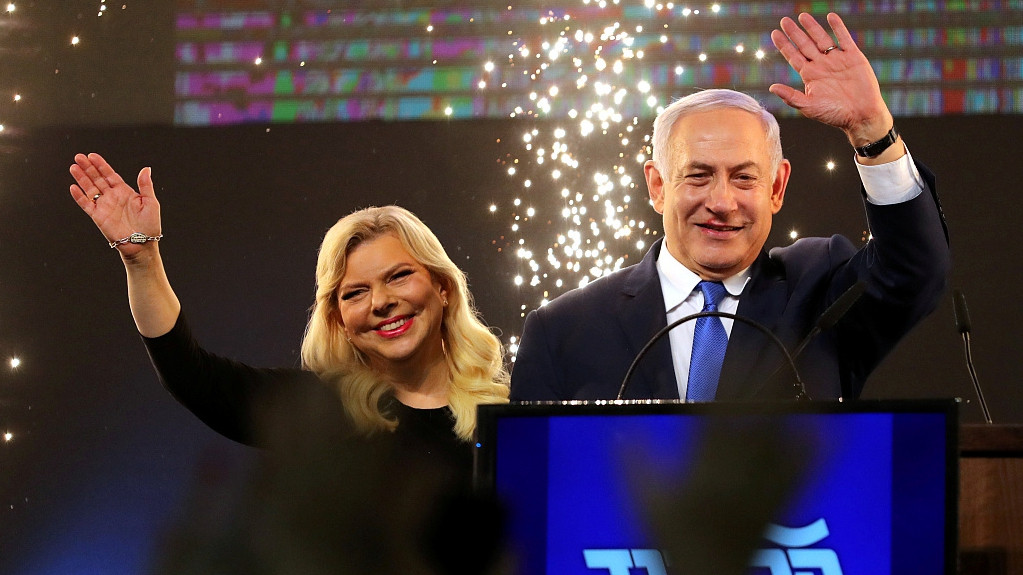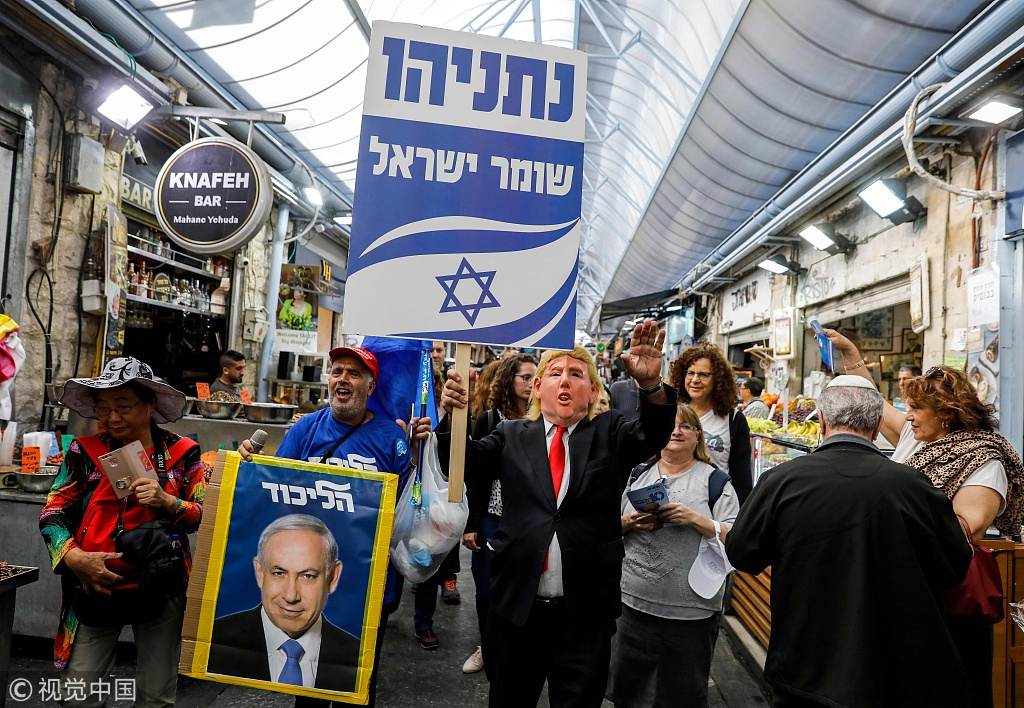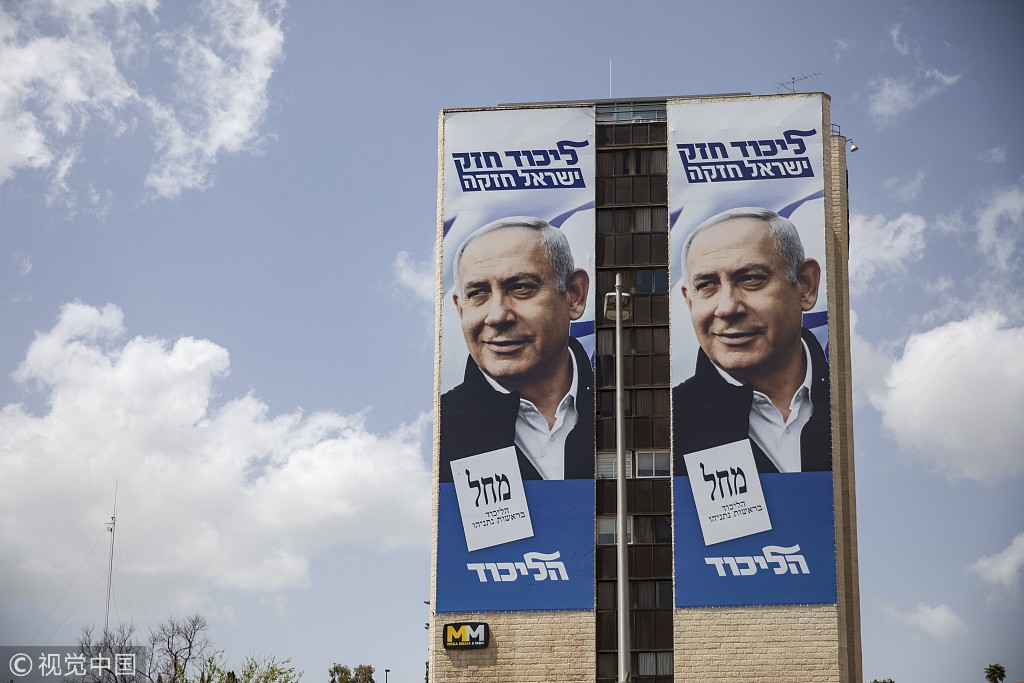
Opinion
13:16, 13-Apr-2019
New patterns of Israeli political arena
Wang Jin

Editor's Note: Dr. Wang Jin is a research fellow of Charhar Institute in China. The article reflects the author's opinion, and not necessarily the views of CGTN.
On April 11, official results of Israel's elections were published at night, showing Prime Minister Benjamin Netanyahu's party has beaten the main rival, the Blue and White party.
After months of intensive competition, the results of the Israeli election was realized and a new pattern of Israeli political arena might come into the formation in the following weeks. The latest election suggests very new characteristics of Israeli political landscape and will significantly influence Israel's foreign policy and even the regional ties in the Middle East.
The latest Israeli election suggests several important features. First, the future Israeli in this election, two right-wing parties, the sitting prime minister Benjamin Netanyahu led Likud and "Blue and White" led by Benny Gantz both earn 35 seats out of total 120 seats in Israeli parliament (Knesset), and becomes the two biggest parties in the Knesset.

A supporter of Israeli Prime Minister Benjamin Netanyahu wearing a mask with the face of U.S. President Donald Trump marches with a sign that says "Guardian of Israel" in Hebrew, Jerusalem, April 7, 2019. /VCG Photo
A supporter of Israeli Prime Minister Benjamin Netanyahu wearing a mask with the face of U.S. President Donald Trump marches with a sign that says "Guardian of Israel" in Hebrew, Jerusalem, April 7, 2019. /VCG Photo
The following parties ranked from third to eleventh only earns only 4 to 8 seats. Therefore the Likud and "Blue and White" might dominate the future structure of Israeli parliament, while their possible divisions and frictions might also shake the stability of Knesset.
Second, the influence of the right-wing political parties significantly increases while the left-wing and central-wing parties' influence decreases. In the 2015 election, several left-wing and central-wing parties including "Joint List", Meretz, Zionist League, Yesh Atid, and Kulanu enter the Knesset, and these parties won 63 seats in Knesset in total. In the latest election, only four left-wing parties, Meretz, Labor Party, Hadash-Ta'al and Ra'am-Balad, enter the Knesset, while their feast only reaches 14.
The central-wing parties, Yesh Atid and Kulanu in 2015 election, become right-wing parties in this election. Yesh Atid joins the "Blue and White" party and labels itself as a right-wing party, while the Kulanu describes itself as the "real successor of Menachem Begin," who was the leading right-wing politician in Israeli history.
Third, security-oriented issue proves more important than a civil-reforms oriented issue in this election. In this election, Likud and "Blue and White" party both highlight the external threats of Israel, while Kulanu, Meretz, Labor party highlight the necessities for Israeli civil and economic reforms. The Hadash-Ta'al ad Ra'am-Balad, both are Israeli Palestinian parties, call for ethical equality inside Israel. The result of this election shows that Israeli voters still prioritize the security concerns while other social issues, such as rising apartment prices, inter-ethnic divisions, the rift between religious and secular groups, are not perceived as important as security concerns.
The rise of Israeli right-wing parties in this election could be attributed to several causes. First, Iran's influence in the Middle East becomes more and more salient in the past years. In the last Knesset election held in early 2015, Russia did not involve itself in the Syria civil war while Iran's role in Syria was still limited.

Posters for Israeli Prime Minister Benjamin Netanyahu are found on a building before the early general elections in Jerusalem, April 9, 2019. /VCG Photo
Posters for Israeli Prime Minister Benjamin Netanyahu are found on a building before the early general elections in Jerusalem, April 9, 2019. /VCG Photo
However, before this election started in early April, Syria's government, with the help of both Iran and Russia, dominated the civil battlefield, while Iran's influence in Syria became more and more obvious. In 2018 some militias from Tehran-backed military Shia groups in Syria even fired rockets against Israel targets and led to Israeli air-strikes retaliations. How to handle Iran's influence in Syria became an important topic inside Israel.
Second, Hamas still threatens Israeli national security by firing rockets against Israeli targets from Gaza Strip. Weeks before this election started, militias from Hamas dominated Gaza Strip fired rockets against Israeli targets and caused injuries near Tel Aviv of central Israel. Hamas' military strikes shocked Israeli public and Benjamin Netanyahu even canceled his trip to Washington and went back to Israel. Hamas' threat facilitates the rise of right-wing parties in this election.
Third, Donald Trump's Middle East policies encourage the influence of right-wing parties inside Israel. Israeli public opinions are easily influenced by US politicians. In Barack Obama's era, the Israel-U.S. relation was challenged by the worsening ties between Obama and Netanyahu and many criticisms against Netanyahu and his right-wing foreign policies also emerged.
However, after Trump assumed the presidency, given Trump's firm support to Israel's claim over Jerusalem and Golan Heights, the right-wing social and political groups inside Israel have been encouraged and their influence inside Israel grows.
With the rise of right-wing political parties in the upcoming Knesset, Israel's foreign policies might become more assertive, while Israel's stance might become more tough in its negotiation process with Palestine, and the peace prospect in the Middle East might face new challenges and obstacles.
(If you want to contribute and have specific expertise, please contact us at opinions@cgtn.com.)

SITEMAP
Copyright © 2018 CGTN. Beijing ICP prepared NO.16065310-3
Copyright © 2018 CGTN. Beijing ICP prepared NO.16065310-3